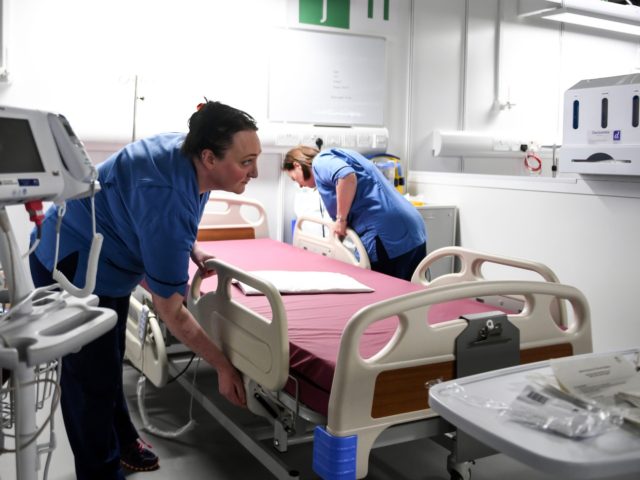Only four out of the 223 National Health Service (NHS) trusts in England are busier now than last year despite the Chinese coronavirus, according to an analysis of official data carried out by a British newspaper.
Prime Minister Boris Johnsons government has been accused of conducting a massive “brainwashing PR campaign” in order to scare the British public into subscribing to continued lockdown restrictions, as hospitalizations are down over last year.
While Cabinet Secretary Michael Gove claimed over the weekend that Britain’s socialised healthcare system would be “physically overwhelmed”, an analysis conducted by the Daily Mail revealed that just four NHS trusts are busier today than last year.
Cambridge University Hospitals Foundation Trust (FT), University College London Hospitals FT, Calderdale and Huddersfield FT, and Wrightington, Wigan and Leigh FT are the only NHS trusts found to be busier than last December.
The report also found that just 87 per cent of available hospital beds were occupied during the third week of November, with 77,942 out of 88,903 beds full. During the week ending on December 8 in 2019, hospital bed occupancy was recorded at 94.9 per cent, when 91,733 the 96,675 available beds were occupied.
The numbers also do not reflect the extra capacity provided to the NHS from private hospitals or the Nightingale field hospitals that were constructed during the early days of the pandemic which added thousands of more beds, meaning that excess capacity is still available should cases increase.
While almost one-third of hospitals in England are seeing more patients with the Chinese virus than the height of the pandemic in April, there are still 4,000 fewer people hospitalised with the virus at present when compared to mid-April.
On April 12th — the busiest hospital day for the National Health Service since the start of the pandemic — there were 18,970 coronavirus patients in the hospital, compared to an average 14,343 during the week ending on November 22.
‘Protect the NHS’ Message that Scared Away Patients Could Contribute to Extra Deaths: Report https://t.co/I1ioy3QkhB
— Breitbart London (@BreitbartLondon) October 19, 2020
A consultant oncologist and professor of medicine at the University of Buckingham, Dr Karol Sikora said that the government was running a “brainwashing PR campaign”, saying they were using “data that doesn’t stack up”.
“We’ve gone back to how it started in March, with [the Government] claiming we need the measures to protect the NHS. The data you’ve shown me proves that it doesn’t need protecting. It’s dealing with Covid very well indeed,” Dr Sikora told the Mail.
“What the data shows is that hospitals are not working at full capacity and they’ve still got some spare beds for Covid if necessary. The public is being misled, the data doesn’t stack up. Fear and scaremongering is being used to keep people out of hospital,” he said.
Dr Sikora concluded by saying that the only way out of the current “mess” is for politicians to be honest with the public about their decision-making process.
Professor Carl Heneghan of Oxford University concurred that the the “data doesn’t add up”, stressing how he believes that it is “imperative” that elected officials make decisions on the basis of being informed.
“It is now clear they [ministers] should have in front of them a combined information package that combines case data with NHS data and they should be provided that weekly in digestible format so it can inform their decisions,” Heneghan said.
“Unless you’ve been playing around with the data like I have, how is an MP meant to know how to access NHS record data?” he questioned.
Minister ‘Can’t Rule Out’ THIRD Lockdown, Says No Normality Until Summer https://t.co/sUwnCaISlR
— Breitbart London (@BreitbartLondon) November 30, 2020
A spokesman for the NHS denied that the figures meant that hospitals were not being overwhelmed, arguing that hospitals have had to reduce the number of beds available in order to limit the spread of the virus in hospital wards.
“This means that trying to compare current occupancy figures with those from before the pandemic is like comparing apples and pears and does not reflect the very real pressures that hospitals are seeing due to rising numbers of patients with Covid-19, which is why it’s so important we all continue to follow the government guidelines and help stop the spread of the virus,” the spokesman said.
On Tuesday, the House of Commons is expected to pass a continuation of lockdown measures for 99 per cent of England, despite a large-scale Conservative Party revolt against the measure, which some have characterised as lacking an evidentiary basis.
One of the opponents of the bill, Sir Graham Brady, the chairman of the 1922 committee of Tory backbench MPs, said: “If government is to take away fundamental liberties of the people whom we represent they must demonstrate beyond question that they are acting in a way that is both proportionate and absolutely necessary.”
“Today… I believe the government has failed to make that compelling case,” he added.
Delingpole: Lockdown III – BoJo's Most Destructive Idiocy Yet https://t.co/I7zIXUjR4v
— Breitbart London (@BreitbartLondon) November 28, 2020
Follow Kurt Zindulka on Twitter here: @KurtZindulka

COMMENTS
Please let us know if you're having issues with commenting.